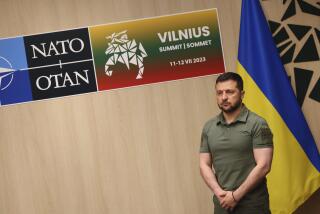NATO OKs Open Skies Plan : Could Help in Verifying Other Pacts
- Share via
BRUSSELS — The 16 NATO allies eased East-West tension another notch today, approving a U.S. proposal that would include letting unarmed Warsaw Pact aircraft fly over their territory in search of suspicious military activity.
The “Open Skies” idea originated with President Dwight D. Eisenhower more than 30 years ago, at the height of the Cold War, and was revised by President Bush last spring to include surveillance of laboratories.
It will be discussed at a NATO-Warsaw Pact meeting in February in Ottawa, Canada, that also could produce new proposals for further troop reductions in Europe.
At the end of a two-day meeting, NATO foreign ministers also agreed to consider proposals by Secretary of State James A. Baker III that the alliance’s role be expanded as the threat of military confrontation with the Soviet Union recedes.
Manfred Woerner, secretary-general of the Western alliance, said he was confident of eventual agreement on setting up NATO panels to verify troop reductions in Europe, and possibly a role in mediating regional conflicts.
The ministers welcomed an unprecedented visit to alliance headquarters by Soviet Foreign Minister Eduard A. Shevardnadze for a meeting with Woerner on Tuesday.
“I don’t see it paving the way for Soviet membership in NATO,” Baker said at a news conference.
Woerner, the former West German defense minister, said he and Shevardnadze will discuss “matters of common interest. This is a first contact.”
“We will have an exchange of views,” he said, but “we will not negotiate.”
A statement concluding the annual winter meeting of NATO foreign ministers welcomed political and economic reforms under way in Eastern Europe and urged that “the progress achieved must be consolidated.”
Baker would not say whether he considered the changes irreversible, but declared: “Everything that we do should be directed to locking in these changes.”
In their statement, the ministers said: “Many problems remain. The rule of law and democratic government through free elections have yet to be fully institutionalized.”
They also included a caution about Soviet military might: “We cannot ignore the military realities that our alliance continues to face and which lie at the heart of Europe’s security problems.”
On “Open Skies,” the ministers said the concept “has a very special value.”
“The willingness of a country to be overflown is, in itself, a highly significant political act in that it demonstrates its availability to openness,” the statement said.
Western alliance ministers said the aerial surveillance could be used to ensure compliance with an agreement being negotiated in Vienna to reduce conventional military forces in Europe.
They proposed that Europe, the Soviet Union, the United States and Canada be open to surveillance flights.
Countries would be assigned quotas, based on size, prescribing the permitted number of observation flights by unarmed, fixed-wing aircraft.
Several flights a month would be allowed over larger countries, and no country could accept fewer than one every three months.
More to Read
Sign up for Essential California
The most important California stories and recommendations in your inbox every morning.
You may occasionally receive promotional content from the Los Angeles Times.













